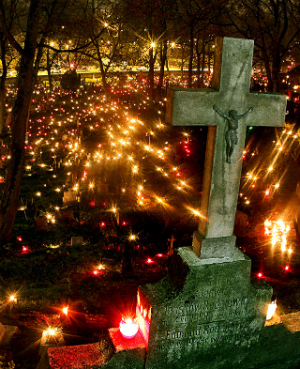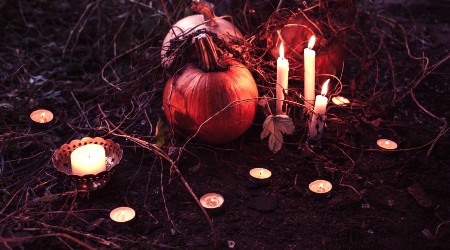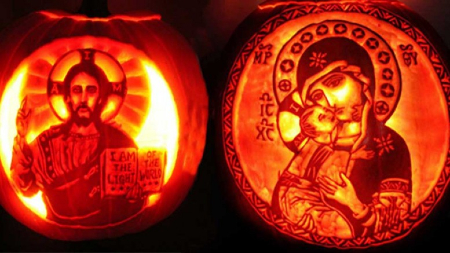We ask you, humbly: don't scroll away.
Hi readers, it seems you use Catholic Online a lot; that's great! It's a little awkward to ask, but we need your help. If you have already donated, we sincerely thank you. We're not salespeople, but we depend on donations averaging $14.76 and fewer than 1% of readers give. If you donate just $5.00, the price of your coffee, Catholic Online School could keep thriving. Thank you.Help Now >
Society of Friends (Quakers)
FREE Catholic Classes
The official designation of an Anglo - American religious sect originally styling themselves "Children of Truth" and "Children of Light", but "in scorn by the world called Quakers".
The founder of the sect, George Fox, son of a well-to-do weaver, was born at Fenny Drayton in Leicestershire, England, July, 1624. His parents, upright people and strict adherents of the established religion , destined him for the Church ; but since the boy, at an early period, felt a strong aversion to a "hireling ministry", he was, after receiving the bare rudiments of education, apprenticed to a shoemaker. He grew to manhood a pure and honest youth, free from the vices of his age, and "endued", says Sewel, "with a gravity and stayedness of mind seldom seen in children". In his nineteenth year, while at a fair with two friends, who were "professors" of religion, he was so shocked by a proposal they made him to join them in drinking healths, that he abandoned their company. Returning home, he spent a sleepless night, in the course of which he thought he heard a voice from heaven crying out to him: "Thou seest how young men go together into vanity, and old people into the earth; thou must forsake all, young and old, keep out of all, and be a stranger unto all." Interpreting the injunction literally, Fox left his father's house, penniless and with Bible in hand to wander about the country in search of light. His mental anguish at times bordered on despair. He sought counsel from renowned "professors"; but their advice that he should take a wife, or sing psalms, or smoke tobacco, was not calculated to solve the problems which perplexed his soul. Finding no food or consolation in the teachings of the Church of England or of the innumerable dissenting sects which flooded the land, he was thrown back upon himself and forced to accept his own imaginings as "revelations". "I fasted much", he tells us in his Journal, "walked abroad in solitary places many days, and often took my Bible and sat in hollow trees and lonesome places until night came on; and frequently in the night walked mournfully about by myself. For I was a man of sorrows in the first working of the Lord in me." This anguish of spirit continued, with intermissions, for some years; and it is not surprising that the lonely youth read into his Bible all his own idiosyncrasies and limitations.
Founding his opinions on isolated texts, he gradually evolved a system at variance with every existing form of Christianity. His central dogma was that of the "inner light", communicated directly to the individual soul by Christ "who enlightenth every man that cometh into the world". To walk in this light and obey the voice of Christ speaking within the soul was to Fox the supreme and sole duty of man. Creeds and churches, councils, rites, and sacraments were discarded as outward things. Even the Scriptures were to be interpreted by the inner light. This was surely carrying the Protestant doctrine of private judgment to its ultimate logical conclusion. Inconvenient passages of Holy Writ, such as those establishing Baptism and the Eucharist, were expounded by Fox in an allegorical sense; whilst other passages were insisted upon with a literalness before unknown. Thus, from the text "Swear not at all", he drew the illicitness of oaths, even when demanded by the magistrate. Titles of honour, salutations, and all similar things conducive to vanity, such as doffing the hat or "scraping with the leg", were to be avoided even in the presence of the king. War, even if defensive, was declared unlawful. Art, music, drama, field-sports, and dancing were rejected as unbecoming the gravity of a Christian. As for attire, he pleaded for that simplicity of dress and absence of ornament which later became the most striking peculiarity of his followers. There was no room in his system for the ordained and salaried clergy of other religions, Fox proclaiming that every man, woman or child, when moved by the Spirit, had an equal right to prophesy and give testimony for the edification of the brethren. Two conclusions, with disagreeable consequence to the early Friends, were drawn from this rejection of a " priesthood "; the first was, that they refused to pay tithes or church rates; the second, that they celebrated marriage among themselves, without calling in the services of the legally appointed minister.
Impelled by frequent "revelations", Fox began the public preaching of his novel tenets in 1647. It was not his intention to increase the religious confusion of the time by the addition of a new sect. He seems to have been persuaded that the doctrine by means of which he himself had "come up in spirit through the flaming sword into the paradise of God " would be greeted alike by Christian, Turk, and heathen. The enthusiasm and evident sincerity of the uncouth young preacher gained him numerous converts in all parts of Britain; whilst the accession of Margaret, wife of Judge Fell, afterwards of Fox himself, secured to the Friends a valuable rallying-point in the seclusion of Swarthmoor Hall, Lancashire. In an incredibly short time, a host of unordained apostles, male and female, were scouring the two hemispheres, carrying to the ends of the earth the gospel of Fox. One enthusiast hastened to Rome to enlighten the pope ; a second went to the Orient to convert the sultan. The antagonistic religions dominant in England before and after the Restoration, Presbyterianism and the Established Church, made equally determined efforts, through the aid of the civil power , to crush the growing sect. From the detailed record which the Friends, in imitation of the primitive Christians, kept of the sufferings of their brethren, we gather that during the reign of Charles II, 13,562 "Quakers" were imprisoned in various parts of England, 198 were transported as slaves beyond seas, and 338 died in prison or of wounds received in violent assaults on their meetings. They fared still worse at the hands of the Puritans in Massachusetts, who spared no cruelty to rid the colony of this "cursed sect of heretics ", and hanged four of them, three men and a woman, on Boston Common. What marked them out for persecution was not so much their theory of the inward light or their rejection of rites and sacraments, as their refusal to pay tithes, or take the oaths prescribed by law, or to have anything to do with the army; these offences being aggravated in the estimation of the magistrates by their obstinacy in refusing to uncover their head in court and "thouing and theeing" the judges. The suffering Friends found at last a powerful protector in the person of their most illustrious convert, William, son of admiral Penn, who defended his coreligionists in tracts and public disputes, and, through his influence with the last two Stuart kings, was frequently successful in shielding them from the violence of the mob and the severity of the magistrates. Penn furthermore secured for them a safe refuge in his great colony of Pennsylvania, the proprietorship of which he acquired from Charles II in liquidation of a loan advanced to the Crown by his father. With the accession to the throne of James II the persecution of the Friends practically ceased; and by successive Acts of Parliament passed after the Revolution of 1688 , their legal disabilities were removed; their scruples about paying tithes and supporting the army were respected; and their affirmation was accepted as equivalent to an oath.
Meanwhile, Fox, in the intervals between his frequent imprisonments, had laboured to impart the semblance of an organization to the society ; whilst the excesses of some of his followers compelled him to enact a code of discipline. His efforts in both these directions encountered strong opposition from many who had been taught to regard the inward light as the all-sufficient guide. However, the majority, sacrificing consistency, acquiesced; and before the death of Fox, 13 Jan., 1691, Quakerism was established on the principles which it has since substantially preserved.
Although the Friends repudiate creeds as "external" and "human", yet they, at least the early Quakers and their orthodox modern followers, admit the fundamental dogmas of Christianity as expounded in the Apostles' Creed. Rejecting as non-Scriptural the term Trinity , they confess the Godhead of the Father, the Son, and the Holy Ghost ; the doctrine of the Redemption and salvation through Christ; and the sanctification of souls through the Holy Spirit. Their ablest apologists, as Robert Barclay and William Penn, have not been able to explain satisfactorily in what respect the "inward light" differs from the light of the individual reason ; neither have they reconciled the doctrine of the supreme authority of the "inner voice" with the "external" claims of Scripture and the historic Christ. These doctrinal weaknesses were fruitful germs of dissensions in later times.
Though one of the earliest of Fox's "testimonies" was in reprobation of "steeple-houses", that is, the stately edifices with which Catholic piety had covered the soil of England, nevertheless, as his adherents grew in numbers, he was forced to gather them into congregations for purposes of worship and business. These "particular meetings" assembled on the first day of the week . They worshiped without any form of liturgy and in silence until some man, woman, or child was moved by the Spirit to "give testimony", the value of which was gauged by the common sense of the assembly. By a process of development, a form of church government came into being, which has been described as follows:
"The whole community of Friends is modelled somewhat on the Presbyterian system. Three gradations of meanings or synods -- monthly, quarterly, and yearly -- administer the affairs of theSociety, including in their supervision matters both of spiritual discipline and secular policy. The monthly meetings, composed of all the congregations within a definite circuit, judge of the fitness of new candidates for membership, supply certificates to such as move to other districts, choose fitpersons to be elders, to watch over the ministry, attempt the reformation or pronounce the expulsion of all such as walk disorderly, and generally seek to stimulate the members to religious duty. They also make provision for the poor of the Society, and secure the education of their children. Overseers are also appointed to assist in the promotion of these objects. At monthly meetings also marriages are sanctioned previous to their solemnization at a meeting for worship. Several monthly meetings compose a quarterly meeting, to which they forward general reports of theircondition, and at whichappeals are heard from their decisions. The yearly meeting holds the same relative position to the quarterly meetings that the latter do to the monthly meetings, and has the general superintendence of theSociety in a particular country." (See Rowntree, Quakerism, Past and Present, p. 60.)All the yearly meetings are supreme and independent, the only bond of union between them being the circular letters which pass between them. The annual letter of London Yearly Meeting is particularly prized. With the passing away of its founders and the cessation of persecution, Quakerism lost its missionary spirit and hardened into a narrow and exclusive sect. Instead of attracting new converts, it developed a mania for enforcing "discipline", and "disowned", that is, expelled, multitudes of its members for trifling matters in which the ordinary conscience could discern no moral offence. In consequence, they dwindled away from year to year, being gradually absorbed by other more vigorous sects, and many drifting into Unitarianism.
In the United States, where, in the beginning of the last century, they had eight prosperous yearly meetings, their progress was arrested by two schisms, known as the Separation of 1828 and the Wilburite Controversy. The disturbance of 1828 was occasioned by the preaching of Elias Hicks (1748-1830), an eloquent and extremely popular speaker, who, in his later years, put forth unsound views concerning the Person and work of Christ. He was denounced as a Unitarian ; and, although the charge seemed well founded, many adhered to him, not so much from partaking his theological heresies, as to protest against the excessive power and influence claimed by the elders and overseers. After several years of wrangling, the Friends were split into two parties, the Orthodox and the Hicksite, each disowning the other, and claiming to be the original society. Ten years later the Orthodox body was again divided by the opposition of John Wilbur to the evangelistic methods of an English missionary, Joseph John Gurney. As the main body of the Orthodox held with Gurney, the Wilburite faction set up a schismatic yearly meeting. These schisms endure to the present day. There is also a microscopical sect known as "Primitive" Friends, mainly offshoots from the Wilburites who claim to have eliminated all the later additions to the faith and practice of the early founders of the society.
In the fields of education, charity, and philanthropy the Friends have occupied a place far out of proportion to their numbers. There exist in the United States many important colleges of their foundation. They are exemplary in the care of their poor and sick. Long before the other denominations, they denounced slavery and would not permit any of their members to own slaves. They did not, however, advocate the abolition of slavery by violent measures. They have also been eminently solicitous for the welfare and fair treatment of the Indians.
According to Dr. H.K. Carroll, the acknowledged authority on the subject of religious statistics (The Christian Advocate, Jan., 1907), the standing of the various branches of Friends in the United States is as follows:
- Orthodox: 1302 ministers, 830 churches, 94,507 communicants
- Hicksite: 115 ministers, 183 churches, 19,545 communicants
- Wilburite: 38 ministers, 53 churches, 4,468 communicants
- Primitive: 11 ministers, 9 churches, 232 communicants
Join the Movement
When you sign up below, you don't just join an email list - you're joining an entire movement for Free world class Catholic education.
-

-
Mysteries of the Rosary
-
St. Faustina Kowalska
-
Litany of the Blessed Virgin Mary
-
Saint of the Day for Wednesday, Oct 4th, 2023
-
Popular Saints
-
St. Francis of Assisi
-
Bible
-
Female / Women Saints
-
7 Morning Prayers you need to get your day started with God
-
Litany of the Blessed Virgin Mary
All Saints' Day, Halloween and All Souls' Day: What's the difference?
-

Should Christians Celebrate Halloween?
-

Since when did Halloween become a Christian holiday?
-
ADORABLE: A Little Boy's Heartfelt Lunchtime Prayer
-
Scientists Decode 3,000-Year-Old Babylonian Tablet, Revealing Potential Location of Noah's Ark
Daily Catholic
 Daily Readings for Friday, November 01, 2024
Daily Readings for Friday, November 01, 2024 St. Valentine Berrio-Ochoa: Saint of the Day for Friday, November 01, 2024
St. Valentine Berrio-Ochoa: Saint of the Day for Friday, November 01, 2024 Litany of the Saints: Prayer of the Day for Friday, November 01, 2024
Litany of the Saints: Prayer of the Day for Friday, November 01, 2024- Daily Readings for Thursday, October 31, 2024
- St. Wolfgang: Saint of the Day for Thursday, October 31, 2024
- Memorare: Prayer of the Day for Thursday, October 31, 2024
![]()
Copyright 2024 Catholic Online. All materials contained on this site, whether written, audible or visual are the exclusive property of Catholic Online and are protected under U.S. and International copyright laws, © Copyright 2024 Catholic Online. Any unauthorized use, without prior written consent of Catholic Online is strictly forbidden and prohibited.
Catholic Online is a Project of Your Catholic Voice Foundation, a Not-for-Profit Corporation. Your Catholic Voice Foundation has been granted a recognition of tax exemption under Section 501(c)(3) of the Internal Revenue Code. Federal Tax Identification Number: 81-0596847. Your gift is tax-deductible as allowed by law.








 Daily Readings for Friday, November 01, 2024
Daily Readings for Friday, November 01, 2024 St. Valentine Berrio-Ochoa: Saint of the Day for Friday, November 01, 2024
St. Valentine Berrio-Ochoa: Saint of the Day for Friday, November 01, 2024 Litany of the Saints: Prayer of the Day for Friday, November 01, 2024
Litany of the Saints: Prayer of the Day for Friday, November 01, 2024


